12 Best Personal Knowledge Management Tools for 2025
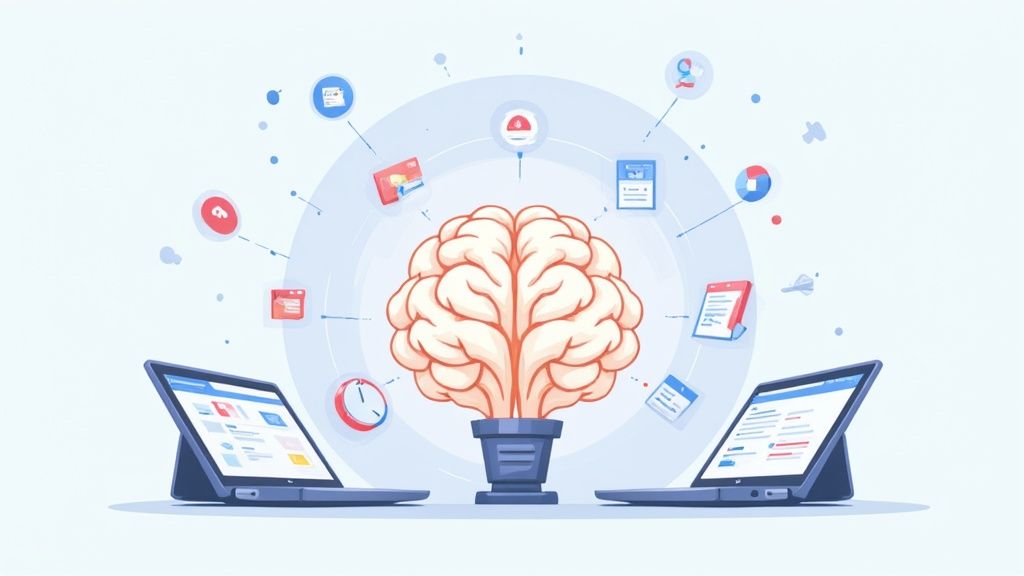
Information overload is a constant battle. We're bombarded with articles, ideas, meeting notes, and tasks daily, making it nearly impossible to keep everything organized. This is where a robust personal knowledge management (PKM) system comes in, acting as a 'second brain' to help you think, connect ideas, and reclaim your focus. The right PKM tool can transform digital chaos into structured clarity, but choosing one is a significant challenge.
The market is crowded with powerful applications, each offering a different philosophy for organizing your life's information. This guide is designed to cut through the noise and provide a clear, in-depth comparison of the top contenders. We will explore 12 of the best personal knowledge management tools, breaking down their unique strengths, weaknesses, and ideal use cases to help you find the perfect fit.
From versatile all-in-one platforms to specialized outliners, each option is analyzed with screenshots and direct links. We'll also provide context on how a pre-built system like Obsibrain can accelerate your workflow within the powerful Obsidian ecosystem. Our goal is simple: to help you select the right platform to centralize your knowledge, connect your thoughts, and amplify your productivity without the guesswork.
1. All-in-One Productivity Template for Obsidian – Obsibrain
Obsibrain isn't just a template; it's a comprehensive, pre-built ecosystem designed to transform Obsidian into the ultimate hub for all your personal knowledge management tools. It stands out by integrating proven productivity frameworks like P.A.R.A. and SMART goal-setting directly into its structure, eliminating the steep learning curve often associated with building a powerful PKM system from scratch. This makes it an exceptional choice for users who want to harness Obsidian's full potential without spending weeks on configuration.
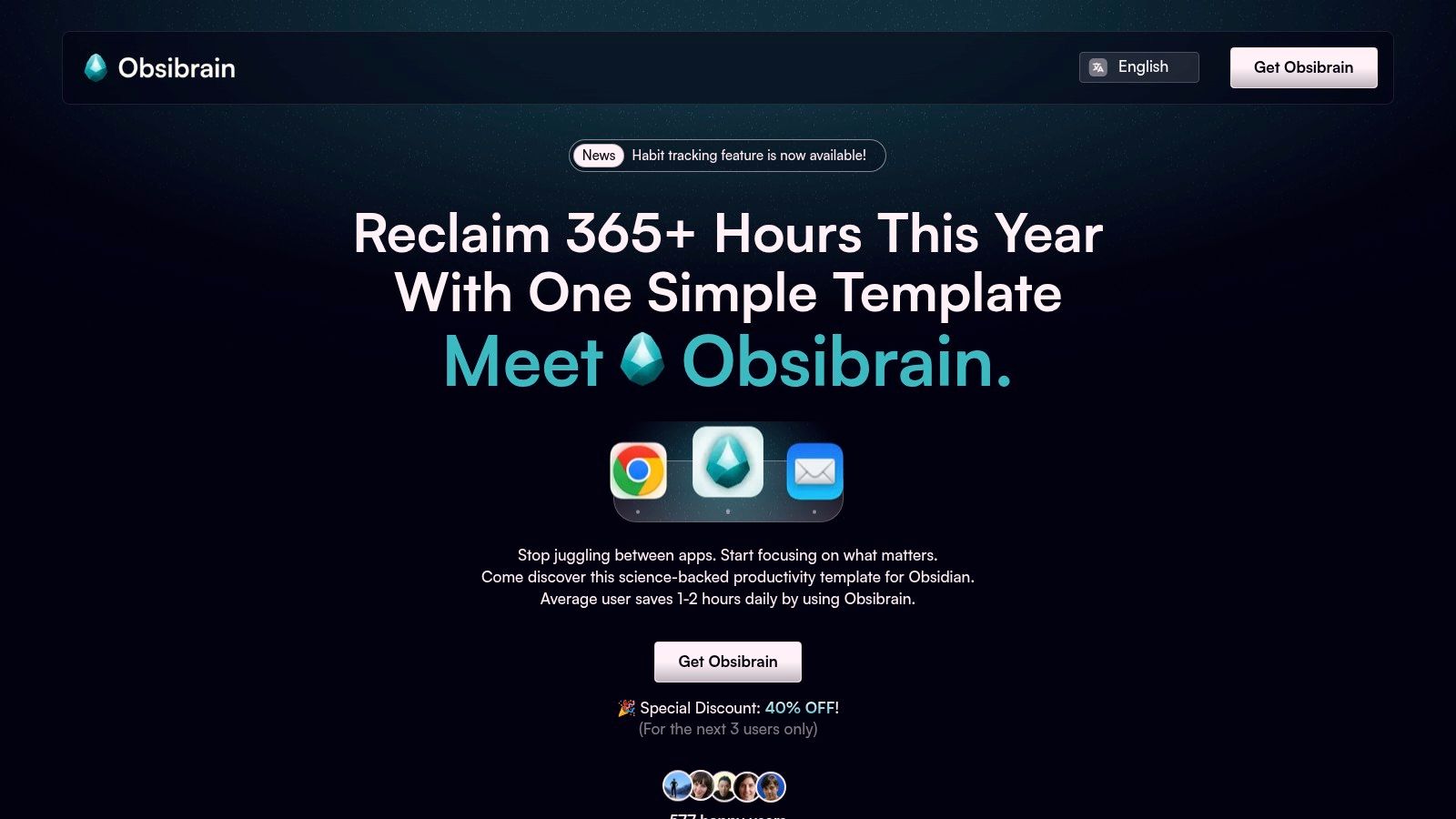
The system excels at unifying disparate aspects of life management into a single, cohesive dashboard. For example, a university student can manage lecture notes, link them to specific project tasks with deadlines, and track related study habits all within one interconnected space. A freelance professional can similarly use it to manage client projects (Projects), store valuable resources and swipe files (Areas/Resources), and maintain a long-term archive of completed work (Archive).
Key Features and Practical Benefits
What truly sets Obsibrain apart is its deep integration of task and habit management. Its robust system allows you to manage tasks with due dates, reminders, and clear prioritization, turning abstract goals into actionable steps. You can explore a detailed breakdown of these capabilities to understand its depth.
Integrated Productivity Frameworks: Combines P.A.R.A. for organization with SMART for project planning, providing a clear, structured approach to managing information and goals.
Comprehensive Tracking: Features dedicated modules for task management, habit tracking with streak visualization, and structured periodic reviews (daily, weekly, monthly, quarterly, and annually).
Seamless Workflow: Intuitive Quick Capture commands and bi-directional linking ensure that ideas are captured and connected effortlessly, fostering a web of contextual knowledge.
One-Time Purchase: Offers a future-proof solution with lifetime updates and access to detailed tutorials and a supportive community, eliminating recurring subscription costs.
Website: https://www.obsibrain.com/en
2. Notion
Notion is an all-in-one workspace that blurs the line between a simple notes app and a powerful database system, making it a uniquely flexible choice among personal knowledge management tools. Instead of individual, isolated notes, every entry in Notion is a page that can be embedded within other pages or, more powerfully, treated as an item in a database. This structure allows you to build everything from a simple to-do list to a complex, relational content calendar or a personal CRM. Its mature ecosystem of templates means you can get started quickly without building from scratch.
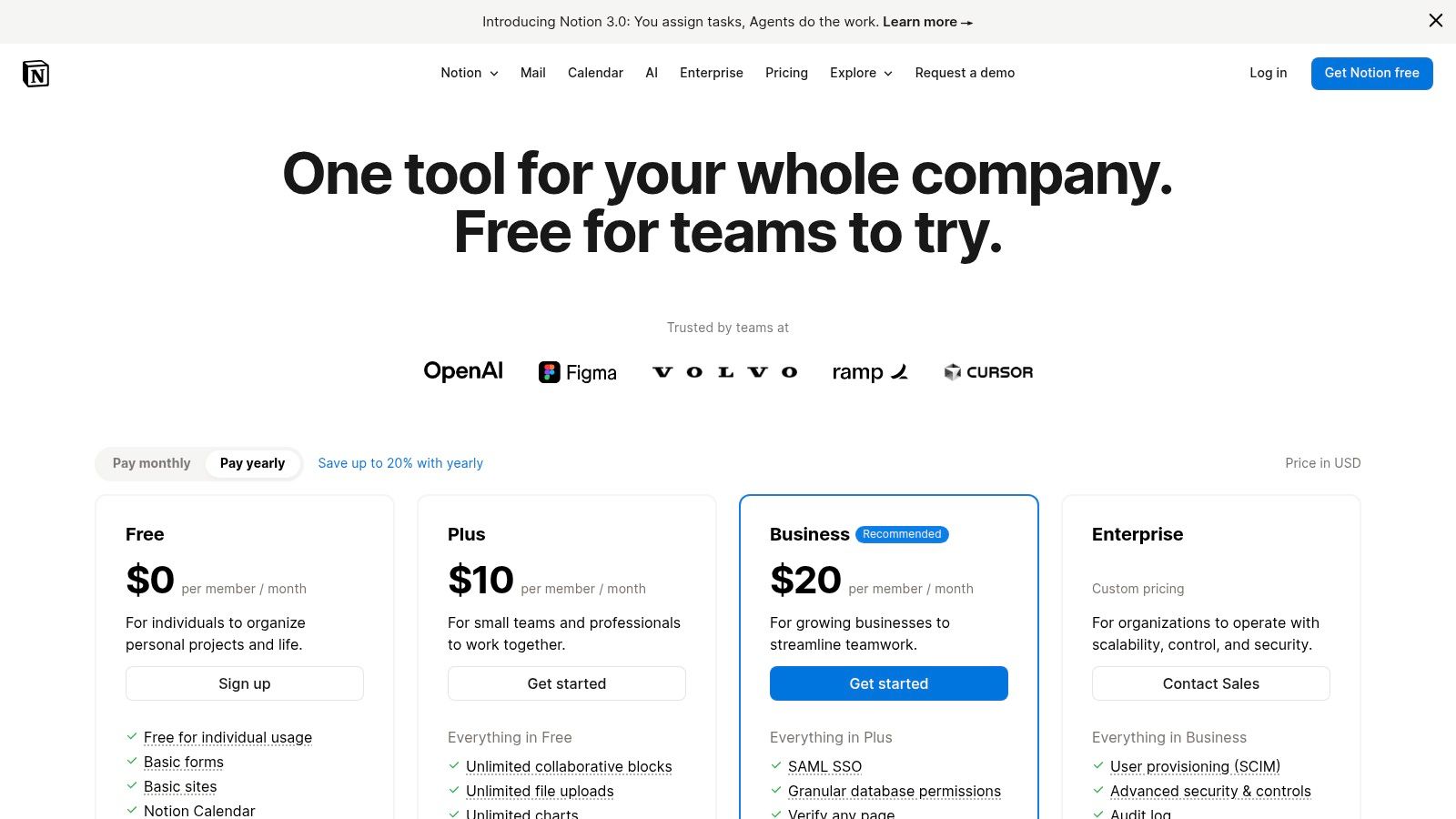
The platform is accessible via a generous free plan for individuals, with paid tiers for teams and advanced features like unlimited file uploads. If you find yourself needing a more structured, database-oriented approach than what a text-based system offers, Notion is a great fit. For example, a project manager might use Obsibrain's daily notes for brainstorming and capturing meeting minutes, then use Notion’s powerful databases to organize those insights into a shared project timeline with assigned tasks and status tracking for the entire team. For users seeking an adaptable platform, you can explore more about Notion and its capabilities.
Pros: Extremely versatile, mature template ecosystem, strong team collaboration features.
Cons: Can feel slow in large workspaces, weaker offline support compared to local-first apps.
Website: https://www.notion.so/pricing
3. Obsidian
Obsidian stands out in the landscape of personal knowledge management tools by championing a local-first, privacy-focused approach. Instead of storing your data on a cloud server, it operates directly on a folder of plain text Markdown files on your computer. This design ensures that you always own your data, making it fast, portable, and secure. Its core strength lies in connecting ideas through backlinks and visualizing these connections in an interactive graph view, helping you build a true "second brain" that mirrors your thought processes.
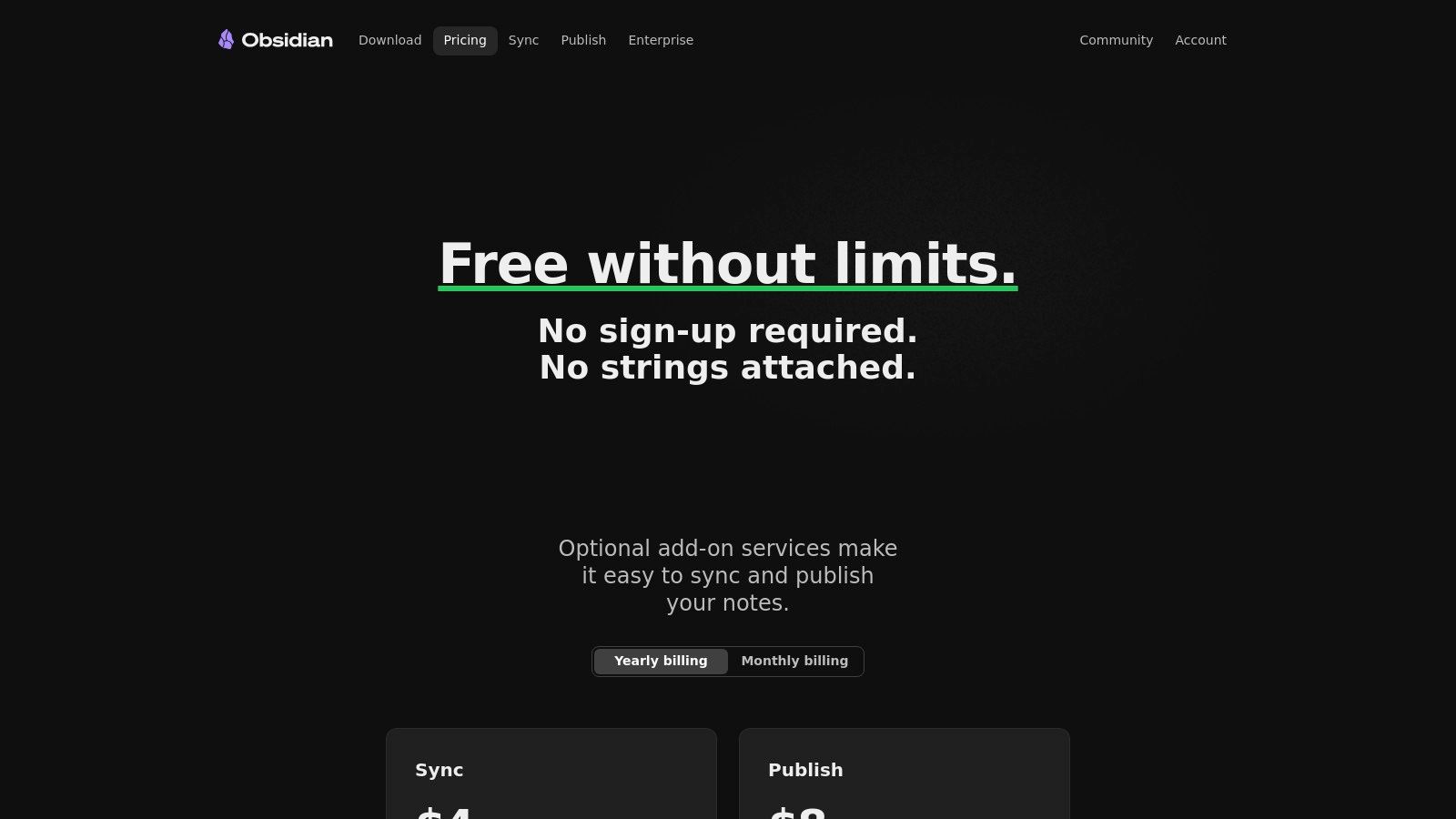
The platform is free for personal use, with optional paid add-ons like Obsidian Sync for encrypted, cross-device access. Where Obsidian excels in offline, atomic note-taking, it can be complemented by tools designed for quick, on-the-go input. For example, a consultant can use Obsibrain’s integrated Quick Capture on their mobile device to log fleeting thoughts and client feedback throughout the day. Later, at their desk, they can integrate these atomic notes into their structured Obsidian vault, linking them to specific client projects and research notes for deeper development. If you value data ownership and endless customizability, you can learn more about how Obsidian's philosophy complements quick-capture workflows.
Pros: Fast, private, and portable due to local Markdown files; huge community/plugin ecosystem for deep customization; optional add-ons keep the core app uncluttered.
Cons: Setup can be overwhelming for beginners; collaboration requires add-ons or third-party tools.
Website: https://obsidian.md/pricing
4. Microsoft OneNote
Microsoft OneNote stands out as a long-standing and robust option among personal knowledge management tools, especially for users embedded in the Microsoft ecosystem. Its strength lies in its freeform, digital notebook metaphor, which organizes information into notebooks, sections, and pages. This hierarchical structure is intuitive for those accustomed to physical binders and is highly effective for capturing unstructured information like meeting minutes, lecture notes, or brainstorming sessions, complete with extensive support for stylus and pen input.
OneNote is free to use with generous cloud storage via OneDrive, but its most powerful features, like the Copilot AI assistant, are unlocked with a Microsoft 365 subscription. While Obsibrain excels at creating a networked web of text-based knowledge, OneNote is a superior choice for capturing rich multimedia content. A student could use Obsibrain for their core Zettelkasten note-taking and project management, then create links to specific OneNote pages containing handwritten diagrams from a lecture, audio recordings of a study group, or clipped web articles that are difficult to format in Markdown. This creates a powerful hybrid system that leverages the strengths of both platforms.
Pros: Excellent for stylus/inking and meeting notes, Deep Microsoft 365 integration for work and school, Mature mobile apps and web access.
Cons: Less suited to graph or backlink-first workflows, Best features tied to Microsoft 365 subscription plans.
5. Evernote
Evernote is one of the original players in the digital note-taking space, establishing itself as a robust repository for capturing almost any kind of information. Its key strength lies in its powerful search capabilities, which include Optical Character Recognition (OCR) that makes text within images and scanned PDFs searchable. This makes it an exceptional "digital filing cabinet" for everything from receipts and business cards to whiteboard snapshots. With recent updates, Evernote has integrated task management, calendar connections, and AI-powered search features, evolving into a more comprehensive organizational hub.
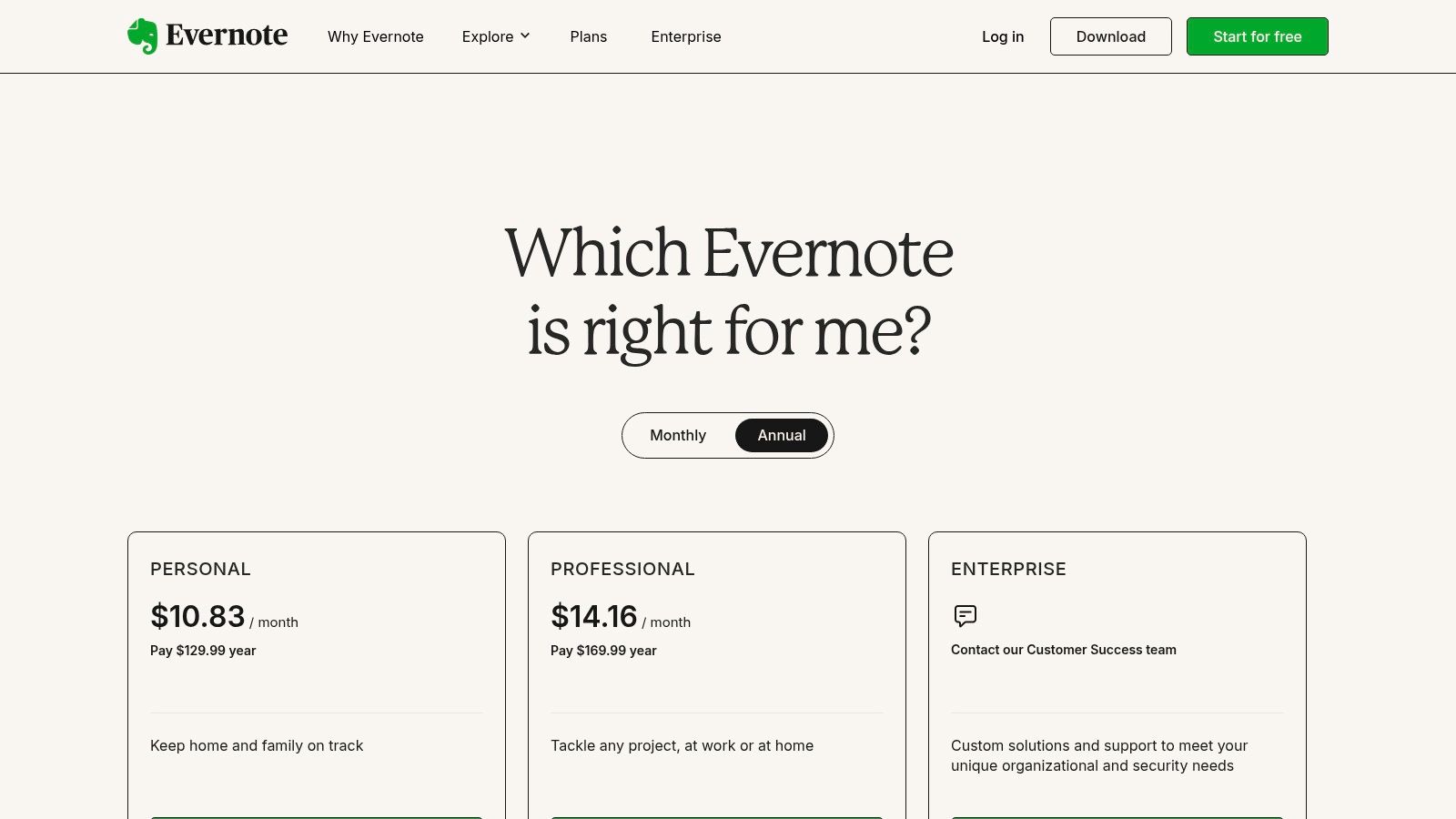
Evernote offers a free plan with significant limitations, while its paid plans unlock its full potential for advanced users. For those who value capturing external information frictionlessly, Evernote is a powerful contender among personal knowledge management tools. An effective hybrid workflow for a researcher could involve using Obsibrain's local-first, linked-thought environment for deep thinking and drafting original content, while leveraging Evernote's superior web clipper and OCR to archive reference articles, scanned book pages, and field notes. They can then link to those Evernote notes from their conceptual maps in Obsibrain to keep their primary workspace clean and focused on creation.
Pros: Excellent content capture and retrieval, familiar and easy cross-device UI, mature web clipper and import tools.
Cons: Price increases compared to historical plans, heavier app footprint compared to local-first tools.
Website: https://evernote.com/pricing
6. Roam Research
Roam Research is a browser-based tool for networked thought that pioneered many of the concepts now popular in modern personal knowledge management tools. It operates as an outliner where every bullet point is a "block" that can be referenced, embedded, and linked elsewhere. This block-based approach, combined with automatic bidirectional linking and a daily notes page, creates an incredibly low-friction environment for building a connected knowledge base, making it a favorite among academics and writers.
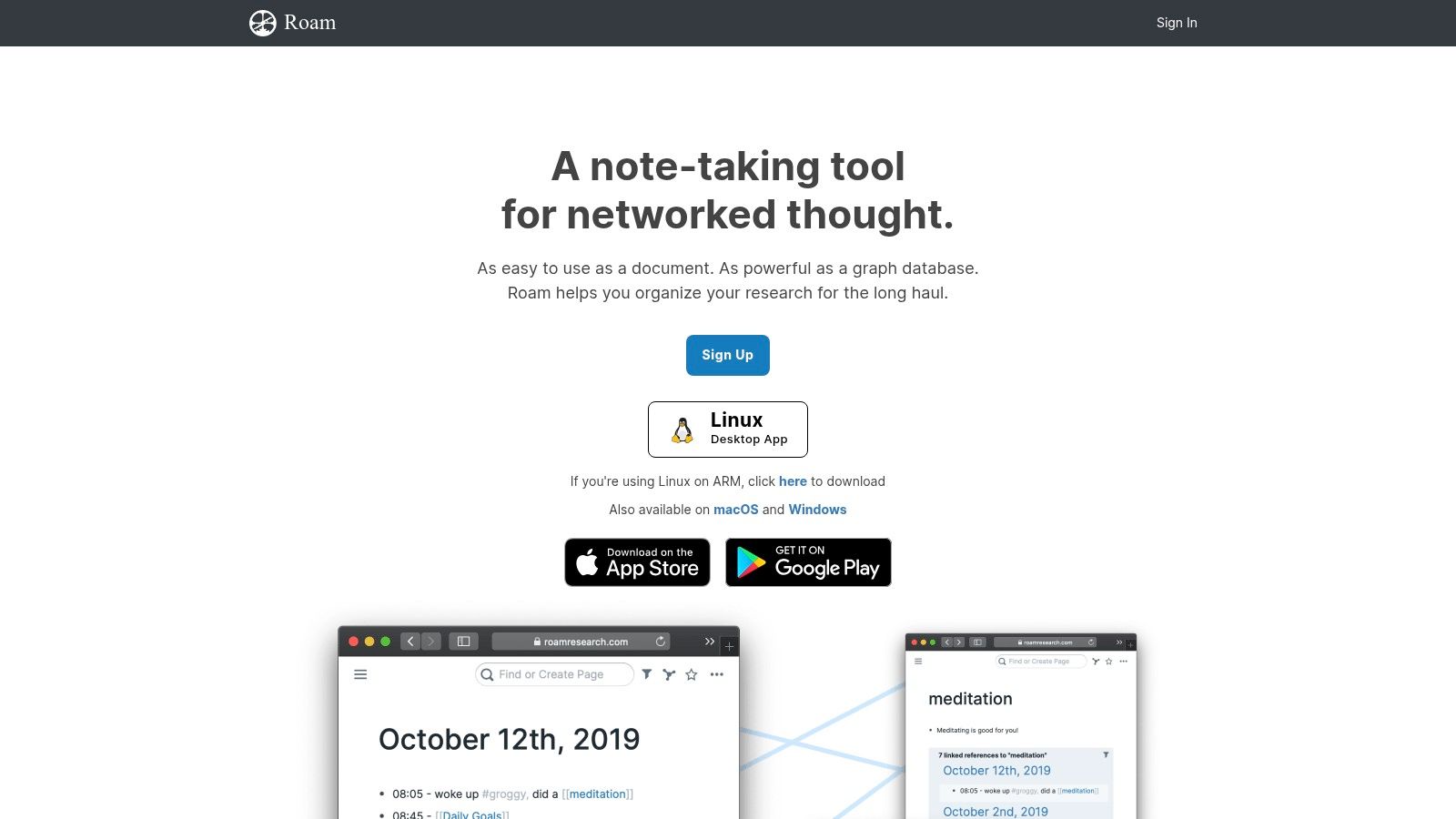
The platform has a single paid plan after a trial period, positioning itself as a premium tool. While Obsibrain offers a similar daily notes and backlinking workflow with greater flexibility and local file control, Roam excels at speed and simplicity for those who live in their browser. A writer might use Roam’s frictionless daily notes to quickly capture fleeting ideas and snippets of dialogue throughout the day. Later, they can synthesize and structure those raw thoughts into long-form chapters or project outlines within Obsibrain, taking advantage of its powerful organizational frameworks like P.A.R.A. and its robust plugin ecosystem for writing.
Pros: Lightning-fast capture and linking ideal for researchers and writers, Minimal friction in building a connected knowledge base.
Cons: Web-first with limited local ownership, Price is higher than many alternatives with limited discounts.
Website: https://roamresearch.com
7. Tana
Tana introduces a powerful graph-based approach to personal knowledge management, centered around its unique "supertags" feature. These tags act like schemas or templates, allowing you to model any piece of information, from a meeting note to a research paper, with predefined fields. This combines the fluid, networked structure of an outliner with the organizational power of a lightweight database, making it ideal for users who want more structure than a plain text file without the full complexity of a tool like Notion.
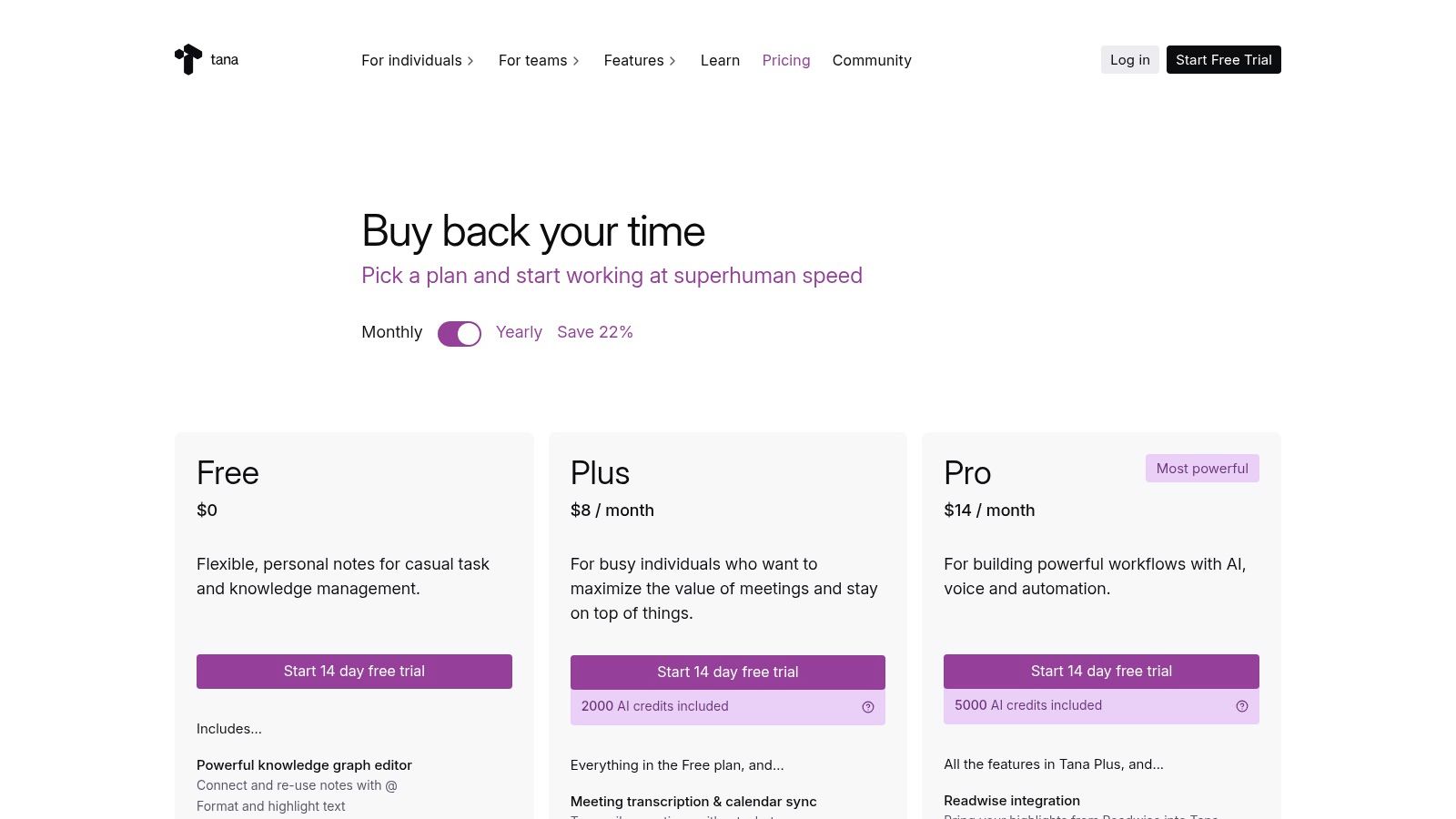
The platform also leans heavily into AI, offering built-in features like meeting transcription and intelligent data capture. It operates on a tiered pricing model, with a free plan for starters and paid plans that unlock more advanced features and higher AI usage limits. While Obsibrain is excellent for free-form thinking and daily journaling, you could use Tana to structure the outputs of that thinking. For instance, after a product manager conducts a brainstorming session in an Obsibrain daily note, they could move the key action items into Tana, applying a #task supertag to automatically track due dates, assign projects, and set priority levels in a structured, queryable format.
Pros: Combines networked notes with lightweight database functionality, Good out-of-the-box AI integration.
Cons: Platform still evolving with occasional plan/features changes, Requires learning supertags and commands for full power.
Website: https://tana.inc/pricing
8. DEVONthink
DEVONthink is a powerful, Mac-centric database application that acts more like a second brain for serious researchers and archivists than a simple notes app. Its core strength lies in its ability to ingest, organize, and find connections within vast amounts of diverse files, from PDFs and web archives to emails and images. The on-device AI helps classify documents and uncovers relationships you might otherwise miss, making it one of the most robust personal knowledge management tools for offline, in-depth research.
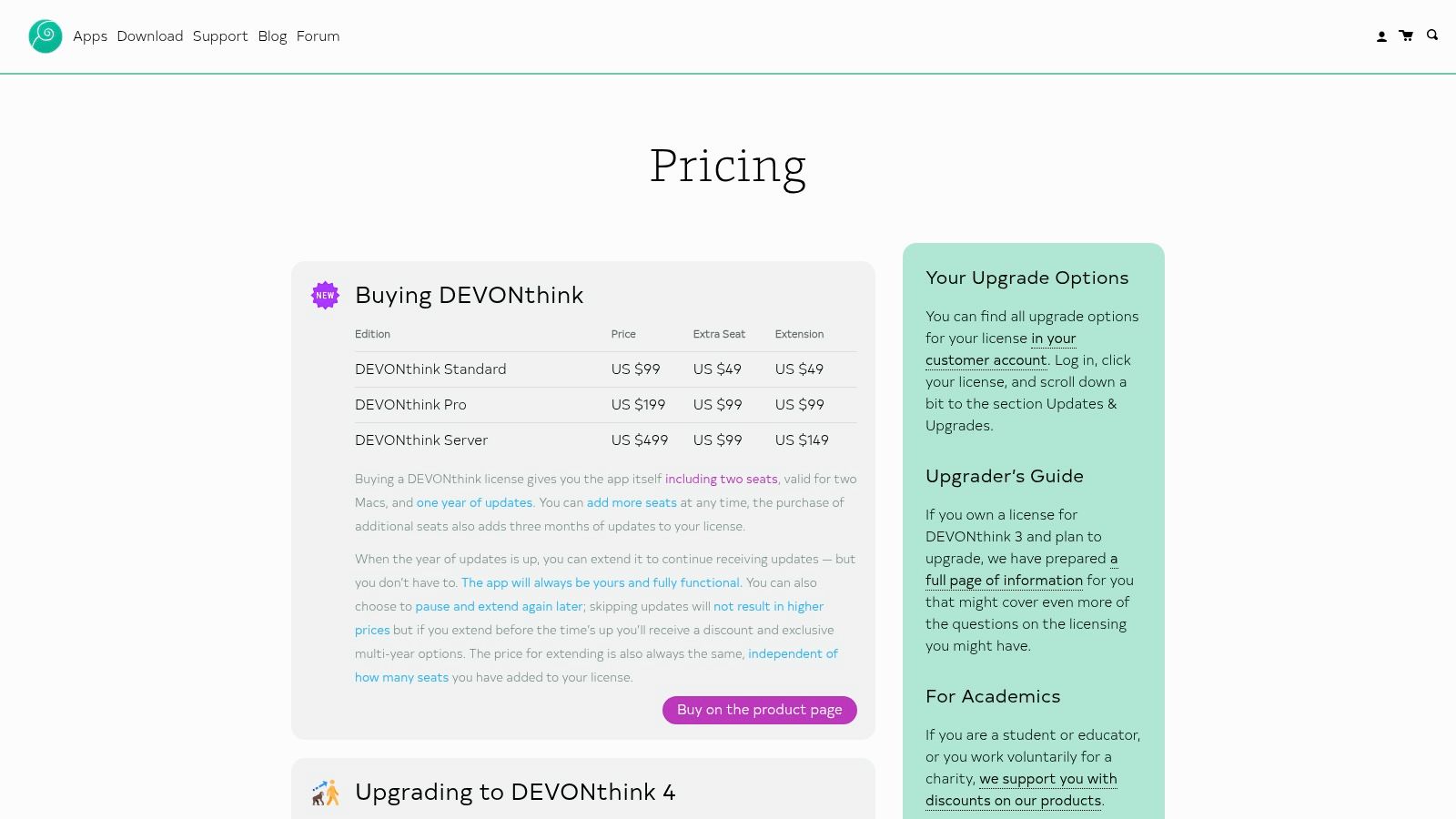
The platform is available as a one-time purchase with different tiers, providing full ownership of the software and data. While Obsibrain excels at networked thought and creative linking, DEVONthink is the superior choice for managing and archiving finalized research materials. An academic could use Obsibrain for their initial thinking, drafting papers, and connecting concepts. Once a research project is complete, they can export the finished notes and all related source PDFs into a DEVONthink database, creating a permanent, searchable, and AI-analyzed archive of their work. For users interested in structured archiving, you can learn more about how DEVONthink's repository approach complements a P.A.R.A. folder structure.
Pros: Excellent for offline-first use and large research archives, One-time license with user ownership of app and data.
Cons: macOS and iOS only, Interface and workflows geared toward power users.
9. Logseq
Logseq is an open-source, local-first outliner that prioritizes privacy and user control, making it a compelling choice among personal knowledge management tools. It operates on plain Markdown or Org-mode files stored on your device, offering a powerful, non-proprietary foundation for your notes. Its core strength lies in its block-based, outliner structure, where every bullet point is a block that can be referenced, embedded, and linked elsewhere. This encourages a fluid, non-linear approach to thinking, especially through its daily journal feature.
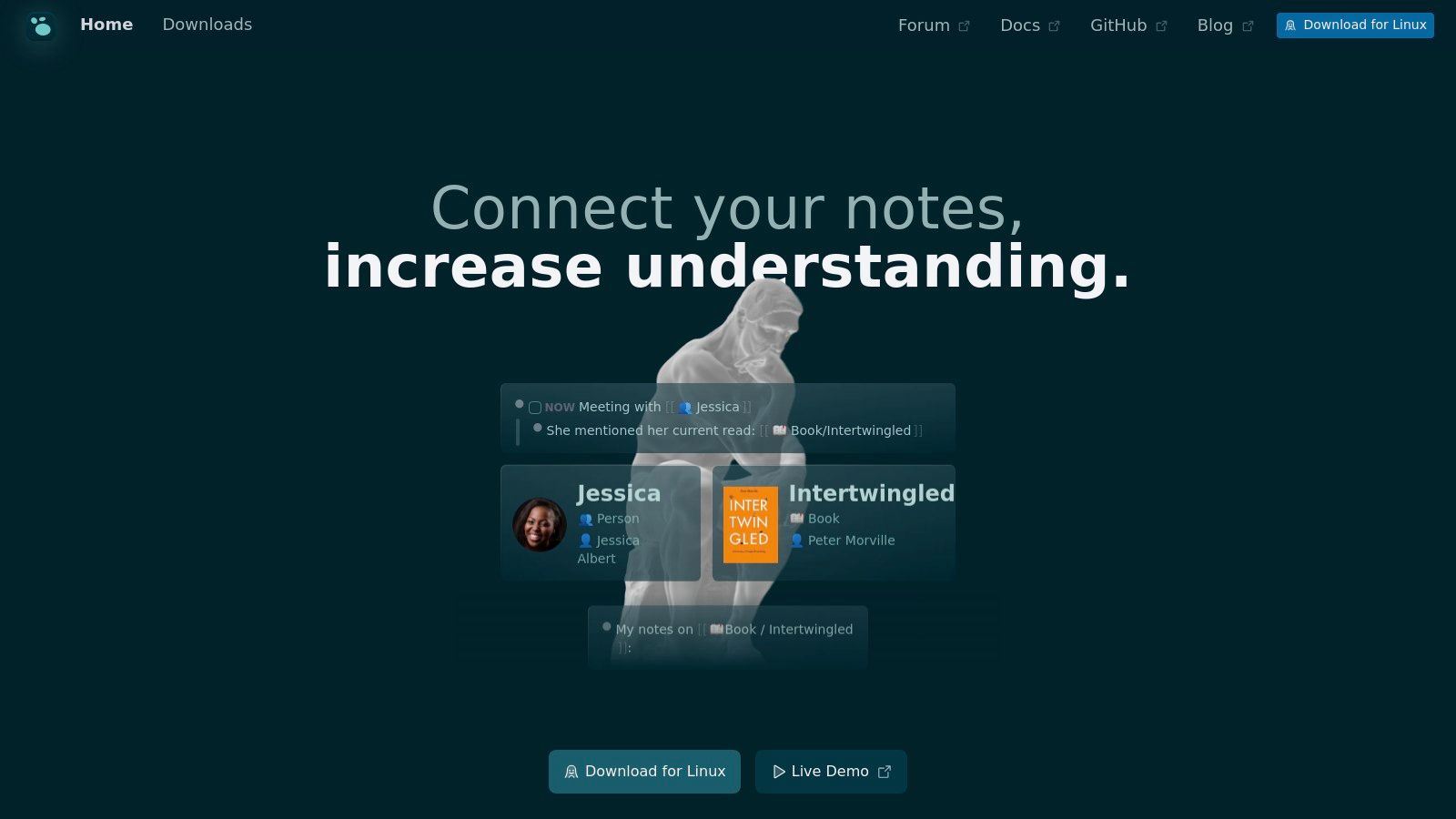
The core application is free, with mobile and desktop apps available. While you can sync your files using any cloud service like Dropbox or Google Drive, Logseq is also rolling out paid Pro services for official sync and collaboration. If you love Obsibrain’s local-first philosophy and structured project management but prefer a daily, journal-centric workflow for ideation, Logseq is an excellent companion. For instance, a software developer could use Logseq’s daily notes to capture fleeting thoughts, code snippets, and bug ideas throughout the day, then use Obsibrain's dedicated project templates to organize those notes into structured, long-term development projects with clear goals and timelines.
Pros: Free and open-source with an active community, easy self-syncing through cloud folders, strong privacy with local-first files.
Cons: Official sync and Pro pricing are still evolving, can experience friction on mobile with very large graphs.
Website: https://logseq.com
10. Capacities
Capacities introduces an object-based approach to personal knowledge management tools, creating a "studio for your mind" that blends networked note-taking with structured data. Instead of just plain notes, you create different "object types" like People, Meetings, or Books, each with its own unique template and properties. This allows you to build a personal knowledge database where information is interconnected in a meaningful, contextual way, similar to a lightweight version of Notion’s databases but with a stronger focus on networked thought.
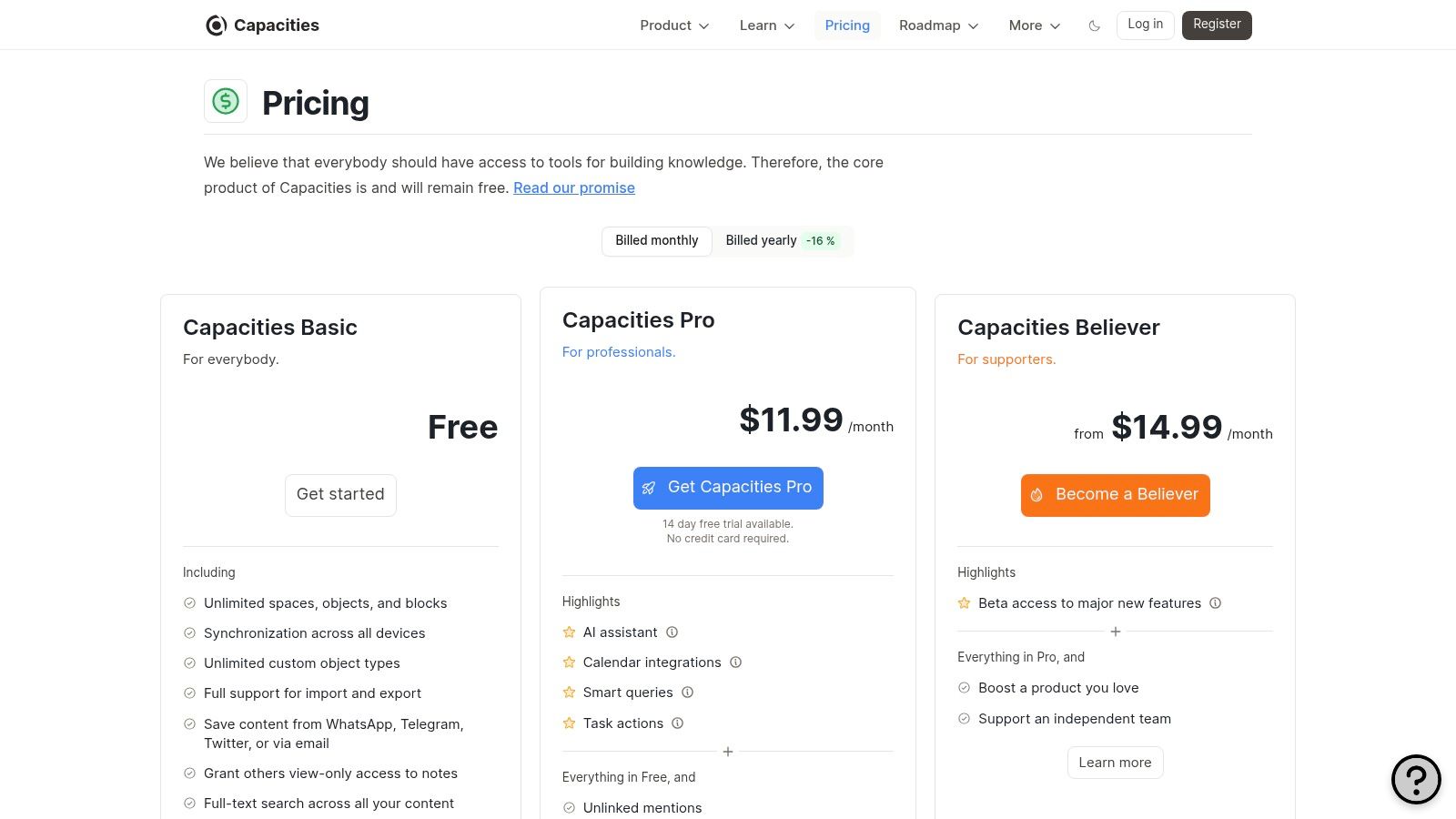
The platform offers a robust free tier, with paid "Pro" and "Believer" tiers unlocking advanced features like an AI assistant. Its emphasis on transparent data export makes it a safe choice for users concerned about data lock-in. While Obsibrain is excellent for freeform, text-based daily notes and creative exploration, Capacities shines when you want to structure that information. For instance, a book author could use Obsibrain for brainstorming plot points and drafting chapters, then use Capacities to create distinct "Character," "Location," and "Plot" objects, linking them together to build a structured, queryable story bible.
Pros: Great balance between note-taking and knowledge database functionality, Transparent data export options enhancing mobility.
Cons: Web-first with a less mature offline/local story, Pricing and features have iterated; users should verify current tiers.
Website: https://capacities.io/pricing
11. Craft
Craft is a beautifully designed, document-centric app that offers a highly polished and intuitive experience, particularly for those within the Apple ecosystem. It functions like a supercharged version of Apple Notes, blending a smooth, block-based editor with powerful features like bi-directional linking and shareable web pages. This makes it one of the most visually appealing personal knowledge management tools, ideal for creating content that is meant to be shared and presented. Its AI assistant, powered by GPT-4o, further enhances its capabilities for drafting and refining ideas.
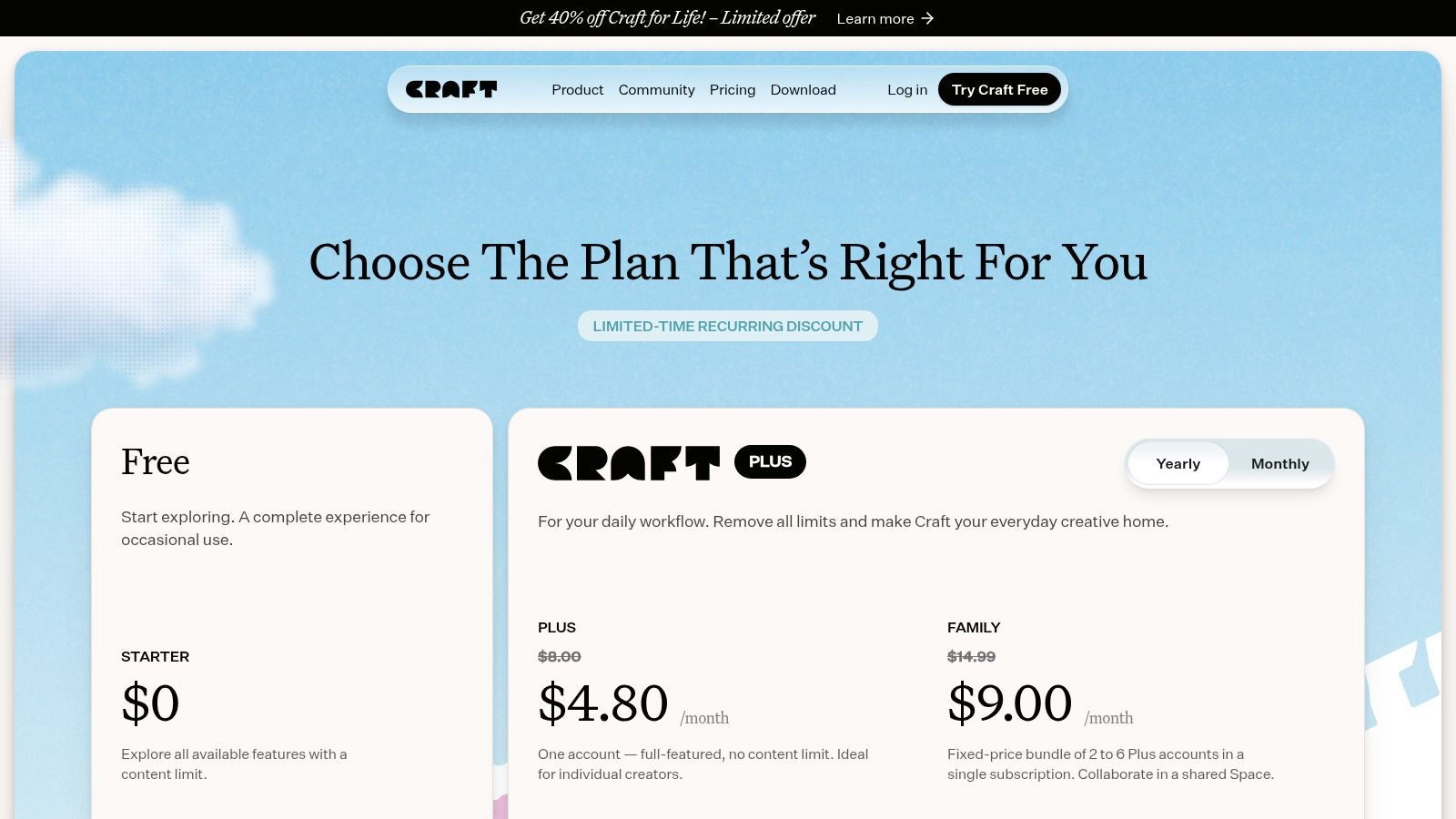
Craft offers a free tier for personal use with some limitations, while paid plans unlock unlimited blocks, larger uploads, and advanced collaboration features. It's also available through the Setapp subscription service. If Obsibrain's Markdown-heavy interface feels too utilitarian for your public-facing notes or portfolios, Craft is an excellent companion. A freelance designer could use Obsibrain's private, interconnected vault for raw brainstorming, project management, and daily journaling. They could then use Craft to polish specific project proposals or case studies into beautiful, shareable web documents to send to clients, leveraging Craft's superior design and presentation features.
Pros: Excellent editing experience and presentation quality, friendly learning curve with progressively powerful features.
Cons: Best experience within the Apple ecosystem, database-style views less advanced than competitors like Notion or Tana.
Website: https://www.craft.do/pricing
12. Amazon
While not a software tool itself, Amazon functions as an essential marketplace for the physical components that complete many personal knowledge management tools and workflows. It’s the go-to platform for acquiring everything from smart notebooks like the Rocketbook, which can digitize handwritten notes, to high-quality pens, scanners for document archiving, and influential books on knowledge management theory. Its vast selection and reliable, fast shipping make it indispensable for quickly gearing up or upgrading your PKM hardware.
For Obsibrain users, Amazon is the ideal place to source the physical items that feed into a digital system. You might purchase a high-speed document scanner to digitize old journals and feed them into your Obsibrain vault or buy a Kindle to read and highlight books, then use plugins to sync those highlights directly into your notes. The user reviews and ratings provide valuable insights before committing to a purchase, ensuring you get the right gear to complement your digital setup. Prime membership offers fast, predictable delivery for most items.
Pros: One-stop shop for PKM hardware, books, and accessories; fast, predictable delivery and simple returns.
Cons: Third-party listings vary in quality; buyers should verify reviews and sellers; not ideal for deep software comparisons.
Website: https://www.amazon.com
Top 12 Personal Knowledge Management Tools Comparison
Obsibrain 🏆
Task & habit tracking, P.A.R.A., SMART projects, bi-directional links
★★★★☆ Comprehensive & seamless
💰 One-time purchase, lifetime updates
Individual users, all skill levels
Science-backed frameworks, quick capture, mobile optimized
Notion
Flexible DBs, templates, team collaboration
★★★★☆ Mature & versatile
💰 Subscription-based, team plans
Teams & individuals
Strong templates ecosystem, API integrations
Obsidian
Local Markdown vaults, plugins, offline access
★★★★☆ Fast & private
💰 Free core, paid sync/add-ons
Power users, PKM enthusiasts
Customizable with plugins, full data ownership
Microsoft OneNote
Hierarchical notes, inking, cloud sync
★★★★ Good for multimedia & notes
💰 Free + MS365 subscription for AI
Students, professionals
Pen input, deep MS365 integration
Evernote
OCR, task/calendar integration, AI search
★★★★ Solid & mature
💰 Subscription tiers
Broad user base
Powerful search, robust cross-device sync
Roam Research
Block-based notes, graph view, real-time collaboration
★★★★ Fast & linking-focused
💰 Higher subscription price
Researchers, writers
Atomic notes, networked thinking
Tana
Supertags, AI integration, cross-platform
★★★★ Innovative but evolving
💰 Paid tiers, evolving pricing
Researchers, knowledge workers
Built-in AI, schema & automation
DEVONthink
AI search, PDF/OCR, Mac/iOS only
★★★★ Power-user focused
💰 One-time license
Mac power users, researchers
Offline AI, flexible sync options
Logseq
Open-source, local-first, backlinks, plugins
★★★★ Free & community-driven
💰 Free core, Pro paid services
Privacy-focused, hobbyists
Open-source, strong privacy & extensibility
Capacities
Typed objects, AI assistant, export options
★★★★ Balanced note/database mix
💰 Free + paid tiers
Learners, PKM hybrid users
AI assistant, transparent data exports
Craft
Block notes, GPT-4 AI, Apple ecosystem
★★★★ Polished UX, easy learning
💰 Subscription + Setapp access
Apple users, small teams
GPT-4 AI, shareable spaces
Amazon
PKM gear marketplace, fast shipping
★★★★ Extensive selection
💰 Pay per product
PKM hardware buyers
Wide PKM accessory range, Prime fast shipping
Choosing Your Perfect PKM Partner
Navigating the expansive landscape of personal knowledge management tools can feel overwhelming, but the journey to finding your ideal system is a powerful act of self-investment. As we've explored, the "best" tool is not a universal title but a deeply personal one. Your perfect fit depends entirely on your unique workflow, priorities, and long-term goals.
The core decision often hinges on a few fundamental questions. Do you crave total ownership and infinite extensibility, valuing a system that adapts to you? Then local-first, plain-text options like Obsidian or Logseq are likely your best starting point. Conversely, if seamless collaboration and a polished, all-in-one user experience are paramount, cloud-based platforms like Notion or Craft offer immediate structure and accessibility for teams.
From Features to Workflow
The most critical step is shifting your focus from a simple feature checklist to your desired daily workflow. A tool with a thousand features is useless if it creates friction in your process. The goal is to build a "second brain" that feels like a natural extension of your own mind, not another complicated app you have to manage.
Consider these key factors before making your final choice:
Your Primary Use Case: Are you a student organizing research notes, a professional managing complex projects, or a creative connecting disparate ideas? The needs of an academic using Obsidian with the Obsibrain template for structured Zettelkasten will differ greatly from a marketing team using Notion for a shared content calendar.
Data Philosophy: How important are privacy and data ownership to you? Tools like Obsidian, Logseq, and DEVONthink keep your data on your local machine, giving you complete control. Others, like Evernote and Notion, store it on their servers, offering convenience at the cost of control.
Learning Curve vs. Customization: Are you willing to invest time in learning a highly customizable system like Tana or Obsidian to build a bespoke setup? Or do you need something like Microsoft OneNote that works intuitively right out of the box?
Taking the Next Step
Don't fall into the trap of analysis paralysis. The only way to truly know if a tool works for you is to use it. Choose two or three top contenders from this list and commit to a trial period, perhaps a week or two for each. Import a small set of your real-world notes and try to replicate your daily tasks. This hands-on experience will reveal more than any review ever could. For those specifically looking for tools optimized for a desktop environment, you might also find a comprehensive review of the 12 best Windows note-taking apps for 2025 to be a valuable resource in your search.
Ultimately, the best personal knowledge management tool is the one you consistently use. Start simple, focus on building the habit of capturing and connecting information, and allow your system to evolve alongside your knowledge. Your second brain is not a static destination; it is a living, growing partner in your intellectual journey.
Ready to transform Obsidian into a powerful, all-in-one life OS without the steep learning curve? Explore Obsibrain, the productivity template designed to structure your notes, tasks, and goals from day one. Start building your ultimate second brain today with Obsibrain.
Last updated